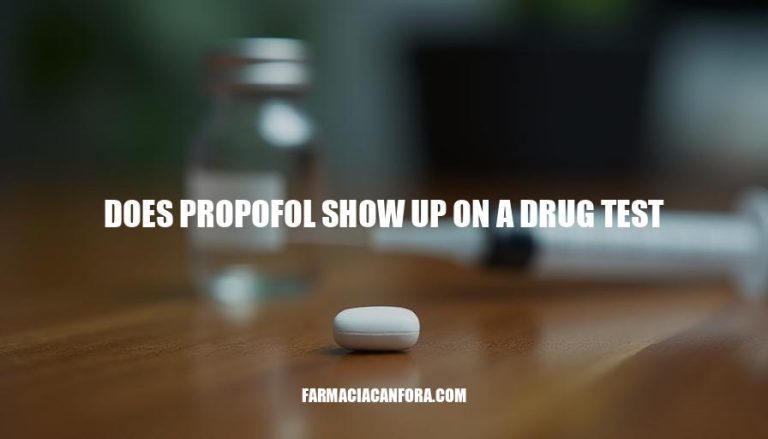


Propofol is a medicine that helps people relax quickly and wake up just as fast. It’s often used in hospitals for operations or when patients need to be sedated while they’re on a ventilator. Propofol works by calming the brain, making it easier to fall asleep and stay asleep.
There are several types of drug tests available, each with its own method of detecting drug use. These include:
Urine Testing: This is the most common type of drug test. It involves analyzing a urine sample to detect the presence of drug metabolites.
It can detect substances like marijuana, cocaine, amphetamines, methamphetamines, benzodiazepines, barbiturates, opiates, and PCP.
Hair Testing: This method involves analyzing a hair sample to detect drug use over a longer period, typically up to 90 days. It can detect substances like cocaine, marijuana, PCP, methamphetamines, and opioids.
Oral Fluid Testing: This involves collecting saliva from an individual’s mouth to detect recent drug use, usually within the past 48 hours. It can detect substances like marijuana/THC, cocaine, amphetamines, opiates, and PCP.
Blood Testing: This is the most accurate method but is less commonly used due to its invasive nature.
It can detect both alcohol and illicit drugs.
Sweat Testing: This involves using a patch that collects sweat over a period of time to detect drug metabolites. It is less common but can be used in specific scenarios.
Residue Testing: Typically used in home testing kits or airports, this method detects drug residues on surfaces.
Regarding propofol, it is not commonly included in standard drug panels. Propofol is a sedative-hypnotic agent used for general anesthesia and sedation in medical settings.
It is not considered a controlled substance and does not typically show up in standard drug tests. However, it can be included in customized drug testing panels, especially in medical or forensic contexts where its use needs to be monitored.
Specific scenarios or professions where propofol might be tested for include:
Healthcare Professionals: In medical settings, propofol is used for sedation during surgeries or procedures. Testing may be conducted to ensure proper use and prevent misuse or diversion.
Forensic Investigations: In cases of suspected drug-related incidents or deaths, propofol might be tested for to determine its involvement.
Drug Challenge Tests: In anesthesiology, propofol might be included in drug challenge tests to diagnose allergies or adverse reactions to anesthesia.
Intensive Care Units (ICU): In critical care settings, propofol is used for sedation of patients, and testing may be conducted to monitor its levels and ensure patient safety.
These are some of the contexts where propofol testing might be relevant.
Propofol is a sedative-hypnotic agent used for general anesthesia and sedation in medical settings, but it’s not commonly included in standard drug panels due to its non-controlled substance status. However, it can be tested for in customized panels or specific scenarios such as healthcare professional monitoring, forensic investigations, drug challenge tests, and intensive care unit settings.
Propofol is detectable through various testing methods, including urine, hair, oral fluid, blood, sweat, and residue testing. The most common type of test used to detect propofol is urine testing, which can detect the presence of propofol metabolites.
Individuals who may be tested for propofol include healthcare professionals, individuals involved in forensic investigations, patients undergoing drug challenge tests, and ICU patients receiving sedation. It’s essential for these individuals to understand that propofol is not typically included in standard drug panels and may only be tested for in specific contexts.
In situations involving propofol and drug tests, it’s crucial to follow proper medical protocols and procedures. Healthcare professionals should ensure accurate testing and monitoring of propofol levels to prevent misuse or diversion. Individuals involved in forensic investigations should consider the context and relevance of propofol testing in their cases. Patients undergoing drug challenge tests should be aware of the potential risks and benefits associated with propofol use.
Ultimately, individuals should approach situations involving propofol and drug tests with caution and understanding of the specific context and protocols involved.